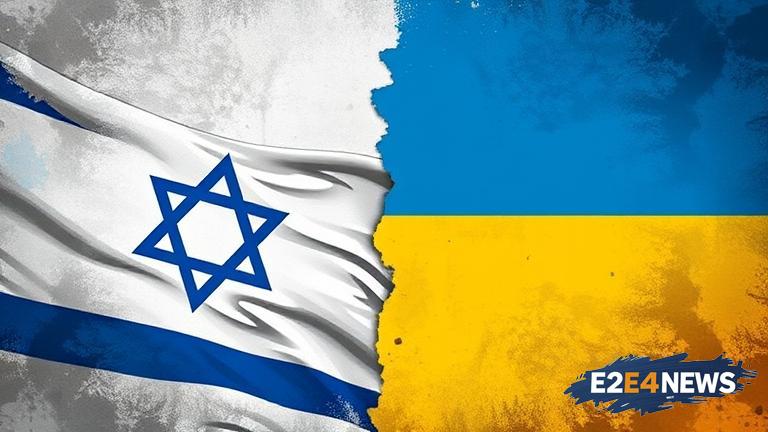In a move that signals a significant shift in Israel’s foreign policy, the country’s foreign minister recently visited Ukraine, marking a new era of cooperation between the two nations. This development is seen as a strategic move by Israel to counter the growing influence of Russia and Iran in the region. The visit comes at a time when tensions between Israel and Iran are running high, with both countries engaging in a series of proxy wars and cyberattacks. Israel’s decision to strengthen ties with Ukraine is also seen as a way to counter Russia’s growing influence in the Middle East, particularly in Syria. The Israeli foreign minister’s visit to Ukraine was marked by a series of high-level meetings with Ukrainian officials, including the country’s president and prime minister. The two sides discussed a range of issues, including trade, security, and cooperation in the fields of technology and innovation. Israel and Ukraine also signed a series of agreements, including a deal to increase trade and investment between the two countries. The visit was seen as a significant success, with both sides expressing their commitment to strengthening ties and cooperating on a range of issues. The development is also seen as a blow to Russia, which has been trying to increase its influence in the Middle East. Russia’s actions in Ukraine, including its annexation of Crimea, have been widely condemned by the international community. Israel’s decision to strengthen ties with Ukraine is also seen as a way to counter Iran’s growing influence in the region. Iran has been accused of providing military support to a range of militant groups, including Hamas and Hezbollah. The Israeli foreign minister’s visit to Ukraine was also marked by a series of statements criticizing Iran’s actions in the region. The minister accused Iran of being a ‘major threat’ to regional stability and called for increased international pressure on the country. The visit was also seen as a way to strengthen Israel’s ties with Europe, with Ukraine being a key partner in the region. The development is also seen as a significant shift in Israel’s stance on Russia, with the country increasingly seeing Russia as a rival rather than a partner. The Israeli foreign minister’s visit to Ukraine was also marked by a series of meetings with European officials, including the European Union’s foreign policy chief. The two sides discussed a range of issues, including cooperation on security and trade. The development is also seen as a way to increase Israel’s influence in the region, with the country seeking to play a more active role in regional affairs. The visit was also seen as a way to strengthen Israel’s ties with the United States, with the country being a key ally in the region. The Israeli foreign minister’s visit to Ukraine was also marked by a series of statements praising the country’s efforts to increase cooperation with the West. The minister accused Russia of trying to undermine Ukraine’s efforts to increase cooperation with the West and called for increased international support for the country. The development is also seen as a significant shift in Israel’s stance on Iran, with the country increasingly seeing Iran as a major threat to regional stability. The Israeli foreign minister’s visit to Ukraine was also marked by a series of statements calling for increased international pressure on Iran. The minister accused Iran of being a ‘major threat’ to regional stability and called for increased international cooperation to counter the country’s influence. The visit was also seen as a way to strengthen Israel’s ties with other countries in the region, including Jordan and Egypt. The development is also seen as a significant shift in Israel’s foreign policy, with the country seeking to play a more active role in regional affairs. The Israeli foreign minister’s visit to Ukraine was also marked by a series of meetings with officials from other countries in the region, including Turkey and Greece. The two sides discussed a range of issues, including cooperation on security and trade. The development is also seen as a way to increase Israel’s influence in the region, with the country seeking to play a more active role in regional affairs.
